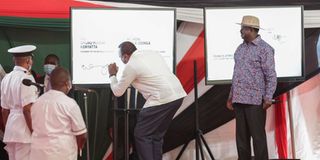It’s callous to rush vote as bigger problems linger

President Uhuru Kenyatta and ODM leader Raila Odinga lead Kenyans in signing the BBI form during the National launch of the BBI signatures collection exercise at KICC in Nairobi County.
What you need to know:
- . Locust invasions threaten food supplies, implying higher prices.
- The Treasury mandarins have been forced to amble back to the IMF and the World Bank and plead for budgetary support
- Our tourism is still very much an external-facing industry despite many years of talking up domestic tourism.
The campaign to collect one million signatures required to kickstart the process that will culminate in a referendum on or about August 2021 effectively puts Kenya in election mode whose climax will be the 2022 General Election. A real pity because it means everything else will be placed on the back burner as energy and resources are directed at an ill-timed and unnecessary exercise feeding the egos of two men.
It is not that we don’t have truly frightening and urgent problems.
The Covid-19 pandemic has over the past two months reminded Kenyans that it is indeed the Grim Reaper whose death count will continue to spiral if people do not restrain their behaviour and zealously observe health protocols to curb its spread. Those protocols will be ignored at the many political rallies likely to be held across the country.
The same pandemic has strangled the economy. The effects of mass layoffs have been devastating on incomes and lifestyles and it will get worse. Many have been living on handouts from relatives who are lucky to be still employed but may have suffered salary cuts. Many others have so far survived on savings that have been exhausted.
Locust invasions
These face a very grim 2021, made more scary by the expected return of higher VAT (16 per cent from the reduced 14 per cent effected as part of the Covid-19 relief measures). Those still in employment will go back to paying 30 per cent tax. Locust invasions threaten food supplies, implying higher prices. Parents with children in school will, in all probability, pay fees for four terms rather than the usual three.
At the macro level, the country is broke. The Treasury mandarins have been forced to amble back to the IMF and the World Bank and plead for budgetary support.
This they will get, but with painful conditions that will effectively downgrade the attractiveness of the country as a destination for debt. This unhappy situation is the result of an unbridled appetite for borrowing to fund large-scale projects, without a deliberate and sustained effort to invest at the micro level that produces the goods and services that generate revenues that pay the debt.
Domestic tourism
Agriculture, which produces food, employs millions and generates much-needed foreign exchange, gets a fraction of what the government has internationally pledged to invest in it. Incentives that could encourage investments in agro-business are not sufficient and the country is far from being the ideal destination for business. The gap between policy promulgation and implementation is still vast.
Our tourism is still very much an external-facing industry despite many years of talking up domestic tourism. That we are still struggling to get to two million visitors annually relying primarily on a three-month “high season” is an embarrassment, yet we have local residents that can keep the hospitality industry busy all year round.
The severe injury caused to the industry by pandemic-linked travel restrictions will hurt for a long time, meaning the crisis in the local industry will linger.
The challenges in rescheduling education and returning it to the pre-Covid normality remain profound as is the challenge in the health sector. Plenty of resources will be required to buy protective equipment for our frontline workers and equip hospitals to take care of the sick.
Already, as the politicians choose to dance to reggae and spend billions to finance the referendum campaign, the doctors have issued a strike notice!
This asymmetry between what we know needs to be prioritised (economic transformation) and what we actually end up prioritising (politics) is an unending conundrum that President Uhuru Kenyatta, as a retiring leader, was best placed to resolve. He lamented this issue not long ago when he complained about politics stalling economic activities every time an election comes around and yet is forcing a referendum before an election!
It explains why this exercise is being seen as an agenda for two people driven by a specific and selfish plan for 2022. There is absolutely no reason the referendum is being treated as an emergency when the country is confronting really calamitous situations.
The pandemic or the country’s debt crisis individually are enough justification to put everything else on hold and focus. But not for these two worthies!
[email protected], @tmshindi





